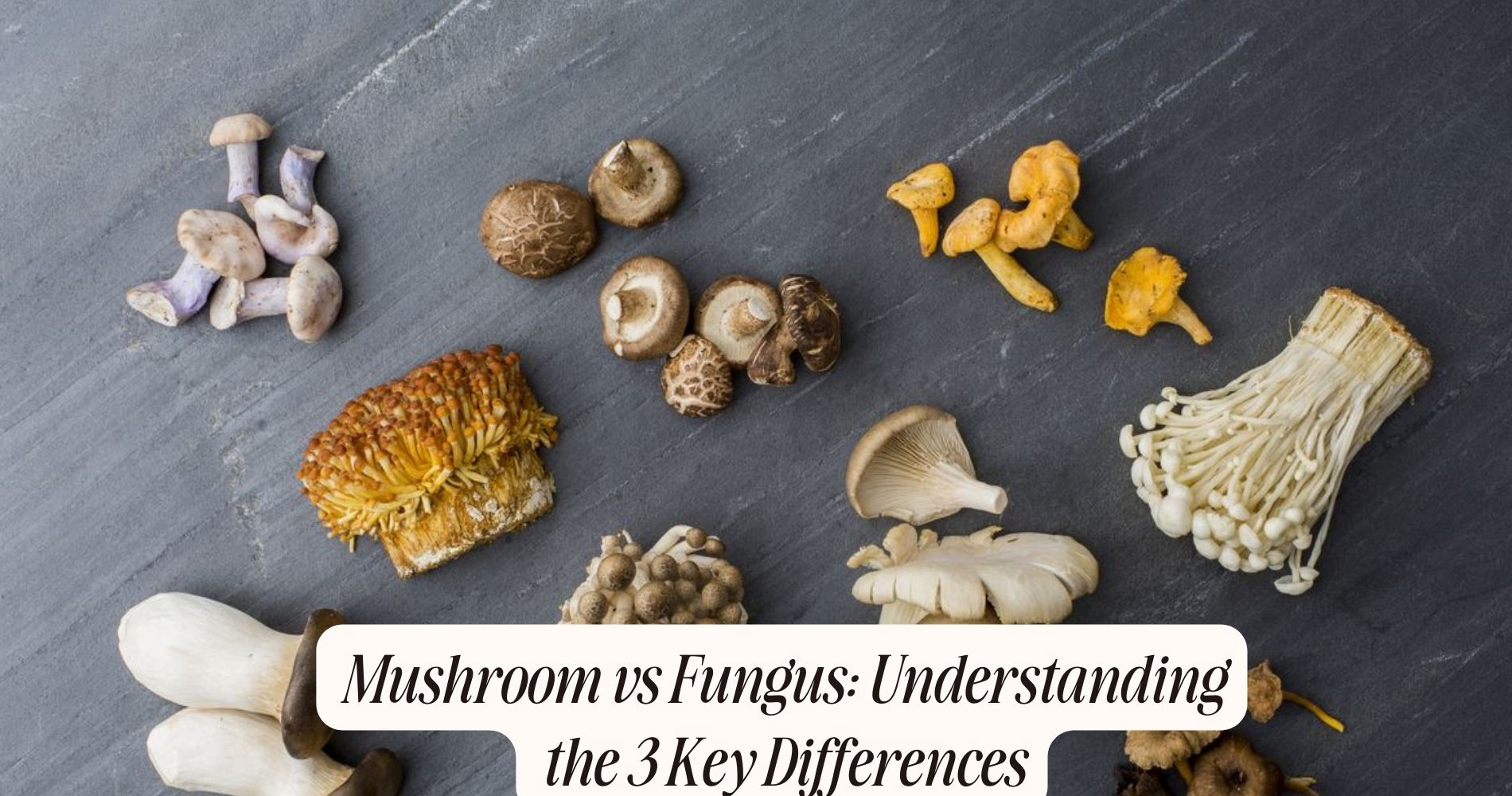
Which Mushrooms Help with Inflammation? An In-depth Look
What mushrooms help with inflammation? For inflammation, several mushrooms can be remarkably effective. Reishi, rich in triterpenoids and polysaccharides, modulates inflammatory responses. Chaga boasts antioxidants like superoxide dismutase and phenolic compounds, reducing oxidative stress. Lion's Mane offers hericenones and erinacines, which decrease inflammatory cytokines. Shiitake's lentinan polysaccharides also combat inflammatory conditions. Maitake contains beta-glucans that regulate immune function. Turkey Tail uses polysaccharopeptides, enhancing immune responses and digestive health. Finally, Cordyceps contains cordycepin, which inhibits pro-inflammatory cytokines. Including these mushrooms in your diet could support effective inflammation management, and there's even more to understand about their unique benefits.
Reishi
Reishi mushrooms, known scientifically as Ganoderma lucidum, are renowned for their potent anti-inflammatory properties. You'll find that these mushrooms have a long history in traditional medicine, primarily due to their bioactive compounds like triterpenoids and polysaccharides, which help reduce inflammation effectively.
When it comes to reishi cultivation, you'll need to understand that they thrive on hardwood logs or sawdust substrates. You'll want to maintain a humid environment with temperatures ranging between 25-30°C for best growth. Proper ventilation is essential to prevent mold, which can compromise the crop's quality. It's a meticulous process but rewarding given the health benefits these mushrooms offer.

Reishi identification is equally important. You'll recognize reishi mushrooms by their distinctive kidney-shaped caps, which are reddish-brown with a varnished appearance. The underside of the cap is white or light brown with tiny pores. They're tough and woody, unlike other softer mushrooms. Make sure to look for these specific characteristics to avoid confusing them with other species.
Chaga
Chaga mushrooms possess potent anti-inflammatory properties attributed to their high concentration of antioxidants like superoxide dismutase.
You'll also find Chaga rich in essential nutrients, including B vitamins, potassium, and magnesium, which support overall health.
Understanding these components can help you better appreciate Chaga's role in managing inflammation.
Anti-inflammatory Properties Explored
In examining the anti-inflammatory properties of Chaga, you'll find that its rich composition of polysaccharides and phenolic compounds plays an essential role in modulating the body's inflammatory response. These bioactive compounds influence immune modulation by interacting with key pathways and cellular mechanisms.
Specifically, the polysaccharides in Chaga have been shown to enhance the activity of macrophages, a type of white blood cell vital for combating inflammation.
The phenolic compounds, particularly betulinic acid and inotodiol, exhibit strong antioxidant properties that help neutralize free radicals, thereby reducing oxidative stress and inflammation. Additionally, Chaga's ability to inhibit the production of pro-inflammatory cytokines, such as TNF-alpha and IL-6, further underscores its potent anti-inflammatory effects.
By downregulating these cytokines, Chaga helps to prevent chronic inflammation, which is often linked to various diseases, including arthritis and cardiovascular conditions.

Furthermore, studies have demonstrated that Chaga extracts can suppress the activation of NF-kB, a protein complex that plays a critical role in inflammatory responses. By targeting these specific molecular pathways, Chaga provides a multi-faceted approach to inflammation management, making it a valuable natural remedy for reducing inflammation and promoting overall health.
Nutritional Benefits Overview
When you incorporate Chaga into your diet, you're enriching your body with a wealth of essential nutrients, including B vitamins, minerals like zinc and potassium, and a diverse array of antioxidants.
Chaga mushrooms are particularly renowned for their high vitamin content, which includes vitamins B1, B2, and B3. These B vitamins play an important role in energy metabolism, helping your body convert nutrients into usable energy efficiently.
Moreover, the mineral variety found in Chaga is impressive. Zinc, for instance, is essential for immune function and cellular repair, while potassium supports cardiovascular health by helping to maintain normal blood pressure levels. The presence of these minerals ensures that your body can carry out a wide array of physiological functions more effectively.
In addition to vitamins and minerals, Chaga mushrooms are packed with antioxidants, such as superoxide dismutase (SOD), which helps combat oxidative stress at the cellular level. This antioxidant activity is critical for reducing inflammation and protecting your cells from damage caused by free radicals.
Lion's Mane
Lion's Mane, scientifically known as Hericium erinaceus, exhibits potent anti-inflammatory properties that can support neurological health. You'll find that one of its most significant benefits is cognitive enhancement. Compounds in Lion's Mane, such as hericenones and erinacines, stimulate the production of Nerve Growth Factor (NGF), a protein vital for the growth, maintenance, and survival of neurons. This stimulation aids in neural regeneration, which can be particularly advantageous in combating neurodegenerative diseases like Alzheimer's and Parkinson's.
When you consume Lion's Mane, you're not only targeting inflammation but also bolstering your brain's ability to repair itself. Studies have shown that this mushroom reduces inflammatory cytokines, which are signaling molecules that promote inflammation. By diminishing these cytokines, Lion's Mane helps protect your brain from chronic inflammation, a key factor in many cognitive disorders.
Moreover, the anti-inflammatory effects aren't limited to the brain. Lion's Mane also supports overall immune function, reducing systemic inflammation that can contribute to various health issues. Incorporating Lion's Mane into your diet could offer a multi-faceted approach to improving both your neurological and overall health, making it a potent ally against inflammation.
Shiitake
Shiitake mushrooms, scientifically known as Lentinula edodes, offer robust anti-inflammatory benefits that can enhance your immune system's functionality. Rich in polysaccharides, particularly lentinan, these mushrooms have demonstrated significant anti-inflammatory properties. Lentinan works by modulating your immune responses, effectively reducing inflammation at the cellular level.
In traditional medicine, shiitake mushrooms have been utilized for centuries, especially in East Asian cultures. They're prescribed to bolster your immune system, combat infections, and support overall health. Modern studies corroborate these traditional uses, highlighting their potential to alleviate inflammatory conditions like arthritis and inflammatory bowel disease.

Culinary uses of shiitake mushrooms are plentiful, making it easy to incorporate them into your diet. They add a rich, umami flavor to a variety of dishes, from soups and stir-fries to risottos and stews. When you cook with shiitake mushrooms, you're not just enhancing the taste of your meals—you're also leveraging their health benefits.
The bioactive compounds, including beta-glucans and ergothioneine, remain effective even after cooking, ensuring that you receive their full anti-inflammatory potential. Integrating shiitake mushrooms into your diet is a practical, delicious way to support your health.
Maitake
Maitake mushrooms, also known as Grifola frondosa, possess powerful anti-inflammatory compounds that can greatly benefit your overall health. They contain bioactive polysaccharides, particularly beta-glucans, which modulate the immune system and reduce inflammation. By targeting inflammatory pathways, these mushrooms can help alleviate chronic inflammation often linked to various ailments.
In cancer treatment, maitake mushrooms have shown promise due to their ability to enhance immune responses. They stimulate natural killer cells and T-cells, which play essential roles in targeting and eliminating cancer cells. Research suggests that maitake extracts, when used in conjunction with conventional therapies, may improve patient outcomes and reduce treatment-related side effects.
Additionally, maitake mushrooms can help regulate blood sugar levels. The polysaccharides in maitake improve insulin sensitivity and glucose metabolism, which is particularly beneficial for individuals with type 2 diabetes or those at risk of developing the condition. By maintaining stable blood sugar levels, you can reduce inflammation caused by hyperglycemia, thereby promoting overall health.
Turkey Tail
Turkey tail mushrooms, scientifically known as Trametes versicolor, are rich in polysaccharopeptides like PSP and PSK that exhibit potent anti-inflammatory properties. When you incorporate turkey tail into your regimen, you're tapping into these powerful compounds that can help modulate your immune system. PSP and PSK are known to support immune function by enhancing the activity of natural killer cells and T-cells, which are vital in the body's defense against pathogens and inflammation.
Another significant benefit of turkey tail mushrooms is their positive impact on digestive health. The polysaccharopeptides in turkey tail act as prebiotics, fostering the growth of beneficial gut bacteria. A healthy gut microbiome is essential for maintaining an excellent immune response and reducing inflammation throughout the body. When your gut is balanced, it can better absorb nutrients and fend off harmful microorganisms, which further supports your overall health.

Incorporating turkey tail mushrooms into your diet can be a strategic move to enhance both immune support and digestive health simultaneously. By doing so, you're not only targeting inflammation but also promoting a holistic approach to wellness that can lead to improved health outcomes.
Cordyceps
When considering Cordyceps, you should note its significant anti-inflammatory properties, which can help reduce cytokine production.
Additionally, this mushroom may enhance athletic performance by increasing ATP production and oxygen utilization.
To achieve these benefits, it's important to understand proper dosage and usage, typically ranging from 1,000 to 3,000 mg per day.
Anti-Inflammatory Properties
Cordyceps, a genus of parasitic fungi, has shown significant potential in reducing inflammation through its bioactive compounds. Comparable to the well-documented turmeric benefits and the efficacy of omega 3s, Cordyceps contains cordycepin, which plays a vital role in modulating inflammatory pathways. This compound inhibits the production of pro-inflammatory cytokines, thereby reducing inflammation at the cellular level.
When you consume Cordyceps, you're introducing a natural inhibitor of nuclear factor-kappa B (NF-κB), a protein complex that controls DNA transcription and inflammatory responses. By suppressing NF-κB, Cordyceps can potentially halt the cascade of inflammatory reactions in your body. Additionally, this mushroom boosts the activity of adenosine, a molecule known for its anti-inflammatory and immunoregulatory functions.
Incorporating Cordyceps into your diet could yield similar anti-inflammatory benefits as those of turmeric and omega 3s, both staples in anti-inflammatory nutrition. Scientific studies have shown that regular intake of Cordyceps can help manage chronic inflammation, providing relief from conditions such as arthritis, asthma, and even certain cardiovascular diseases. For the best anti-inflammatory effects, consider adding Cordyceps supplements or extracts to your daily routine.
Athletic Performance Benefits
In addition to its essential anti-inflammatory properties, Cordyceps offers substantial benefits for athletic performance by enhancing energy production and oxygen utilization.
This mushroom increases the body's production of adenosine triphosphate (ATP), which is crucial for delivering energy to muscles during physical activity. By boosting ATP levels, Cordyceps enables you to perform at higher intensities and for longer durations, directly impacting your stamina and endurance.
Moreover, Cordyceps improves oxygen utilization by increasing the efficiency of your respiratory system. This enhancement allows more oxygen to be delivered to your muscles, reducing fatigue and improving overall performance. The mushroom's ability to enhance oxygen uptake means you can sustain aerobic activities with less effort, making it highly beneficial for both endurance athletes and those engaged in high-intensity training.
Cordyceps also plays an important role in exercise recovery. Its anti-inflammatory properties help reduce muscle soreness after intense workouts, facilitating quicker recovery times. By minimizing inflammation and oxidative stress, Cordyceps aids in repairing muscle tissue, allowing you to bounce back faster and train more consistently.
Utilizing Cordyceps as part of your regimen can significantly improve your athletic performance and recovery, ensuring you stay at the top of your game.
Dosage and Usage
Determining the best dosage and usage of Cordyceps involves understanding its concentration in supplements and your specific health goals. Most supplements contain Cordyceps extract in varying concentrations, typically ranging from 500 mg to 1,000 mg per serving.
For inflammation, studies suggest starting with a daily dose of 1,000 mg, gradually increasing to 3,000 mg based on your body's tolerance and response.
When using Cordyceps, make sure proper storage to maintain its efficacy. Keep the supplements in a cool, dry place away from direct sunlight, as heat and moisture can degrade their active compounds. This ensures you get the maximum anti-inflammatory benefits from each dose.
Be aware of potential side effects. Though generally well-tolerated, some individuals may experience digestive issues, such as diarrhea or stomach cramps. If you notice any adverse reactions, reduce the dosage or discontinue use and consult a healthcare professional.
Additionally, Cordyceps may interact with certain medications, so it's essential to seek medical advice if you're on prescription drugs.
Frequently Asked Questions
Can Mushroom Supplements Interact With Prescription Medications?
Yes, mushroom supplements can interact with prescription medications. You should consult your doctor to confirm supplement safety. Drug interactions could affect your treatment's efficacy or cause adverse effects. Always prioritize professional medical advice.
Are There Any Side Effects of Consuming Medicinal Mushrooms?
When consuming medicinal mushrooms, you might experience side effects such as digestive health issues or exacerbation of autoimmune disorders. It's essential to monitor your body's response and consult a healthcare professional for personalized advice.
How Do Mushrooms Compare to Traditional Anti-Inflammatory Medications?
In clinical trials, mushrooms like reishi and lion's mane show promising efficacy rates for reducing inflammation. While they may not replace traditional anti-inflammatory medications entirely, their natural compounds offer complementary benefits with fewer side effects.
Is It Safe to Consume Medicinal Mushrooms During Pregnancy?
During pregnancy, you should exercise pregnancy precautions when consuming medicinal mushrooms. Always consult your healthcare provider for specific dosage recommendations to guarantee safety and avoid potential risks to you and your baby.
Can Children Benefit From Medicinal Mushrooms for Inflammation?
Yes, children can benefit from medicinal mushrooms for inflammation. Make sure you follow the appropriate child dosage to avoid side effects. These mushrooms can provide immune support, helping to reduce inflammation and promote overall health.
Conclusion
You've learned that mushrooms like Reishi, Chaga, and Lion's Mane can greatly help reduce inflammation.
Shiitake and Maitake offer powerful anti-inflammatory properties, while Turkey Tail boosts your immune response.
Cordyceps also contributes to reducing inflammation and improving overall health.
Including these mushrooms in your diet could be a natural and effective way to manage inflammation.
Always consult a healthcare professional to make sure they're appropriate for your specific needs.




